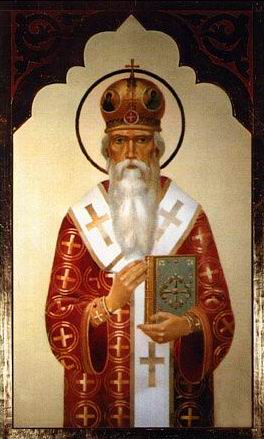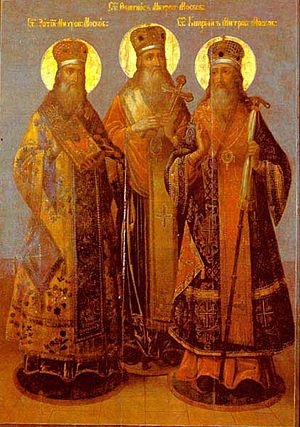Cyprian, Metropolitan of Kiev facts for kids
Quick facts for kids |
|
|---|---|
| Metropolitan of Kiev and All Rus | |
 |
|
| Church | Russian Orthodox Church |
| See | Moscow |
| Enthroned | 1381–1382, 1390–1406 |
| Predecessor | Alexius, Metropolitan of Kiev, Dionysius, Metropolitan of Kiev |
| Successor | Pimen, Metropolitan of Moscow, Photius, Metropolitan of Moscow |
| Personal details | |
| Born | c. 1336 |
| Died | 16 September 1406 |
Cyprian (born around 1336 – died September 16, 1406) was an important church leader, writer, and translator. He served as the Metropolitan of Kiev and All Rus', with his main church office in Moscow. The Russian Orthodox Church remembers him on May 27 and September 16.
Contents
Cyprian's Early Life
Cyprian was likely from a noble family in Great Tarnovo, Bulgaria. He was a type of monk called a Hesychast, who focused on quiet prayer and spiritual peace.
As a young man, Cyprian studied at Kilifarevo, near Tarnovo. There, he probably became a monk. He met Euthymius of Tarnovo, who would later become a Bulgarian patriarch, and they both studied Hesychasm.
In 1363, Cyprian traveled to Constantinople with Euthymius and their teacher, Theodosius. He studied at the Monastery of Stoudios. After Theodosius died, Cyprian continued his studies at Mount Athos, a famous center for monks.
Becoming a Metropolitan
In 1373, Cyprian was sent by the Patriarch of Constantinople to help unite the church in the lands of Lithuania and Muscovy. These areas were often fighting, and the church was becoming divided.
Cyprian visited Kiev and other cities in the Grand Duchy of Lithuania. He also went to Tver. He worked to bring peace between the different princes and church leaders.
In 1375, the Patriarch Philotheus I made Cyprian the "Metropolitan of Kiev, Russia and Lithuania." A Metropolitan is a high-ranking bishop who leads a large church area. This was done to prevent the church from splitting completely.
Cyprian arrived in Kiev in 1376. He tried to get the Grand Duke of Moscow, Dmitry Donskoy, to accept his authority over all the church lands. But this was difficult because of political reasons.
Challenges and Achievements
When Metropolitan Alexius died in 1378, Cyprian faced many challenges. He became Metropolitan of Moscow in 1381, but he had a hard time with the Great Prince there. He sometimes had to live in Lithuania or Constantinople.
In 1379, he had to leave Moscow because of approaching armies. He was replaced by other Metropolitans for a few years.
However, in 1390, Cyprian returned to Moscow. He was supported by Vasily II of Moscow and became Metropolitan of Moscow and All Russia. He held this important position until his death in 1406.
Cyprian's main goal was to keep the church in Russia and Lithuania united. He was a wise church leader who worked hard for this unity. He faced strong opposition from some leaders, but he continued his efforts.
Cyprian was also a very educated person. He helped create and copy many important books. He oversaw the copying of the Troitskaia Chronicle, a historical record. He also rewrote the Life of Metropolitan Peter.
He corrected biblical books and translated many church works from Greek into Old Church Slavic. He also started the Book of Degrees, which listed Russian rulers in order.
Death and Legacy
Cyprian died on September 16, 1406. He is buried in the Assumption Cathedral in Moscow in the Moscow Kremlin.
The Russian Orthodox Church recognized him as a saint in the 15th century. A place in Antarctica, St. Kiprian Peak, is named after him.
See also
 In Spanish: Cipriano de Moscú para niños
In Spanish: Cipriano de Moscú para niños


